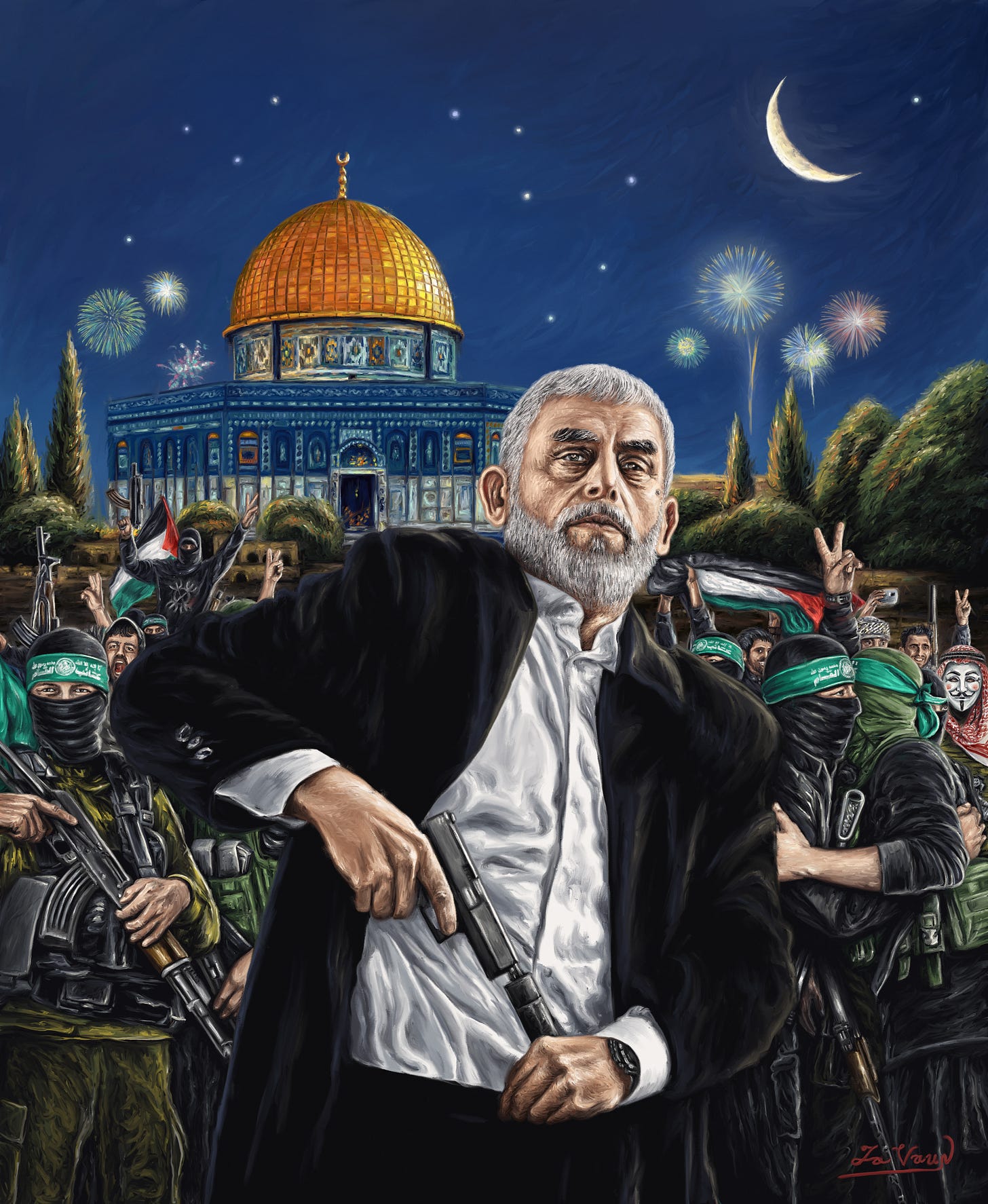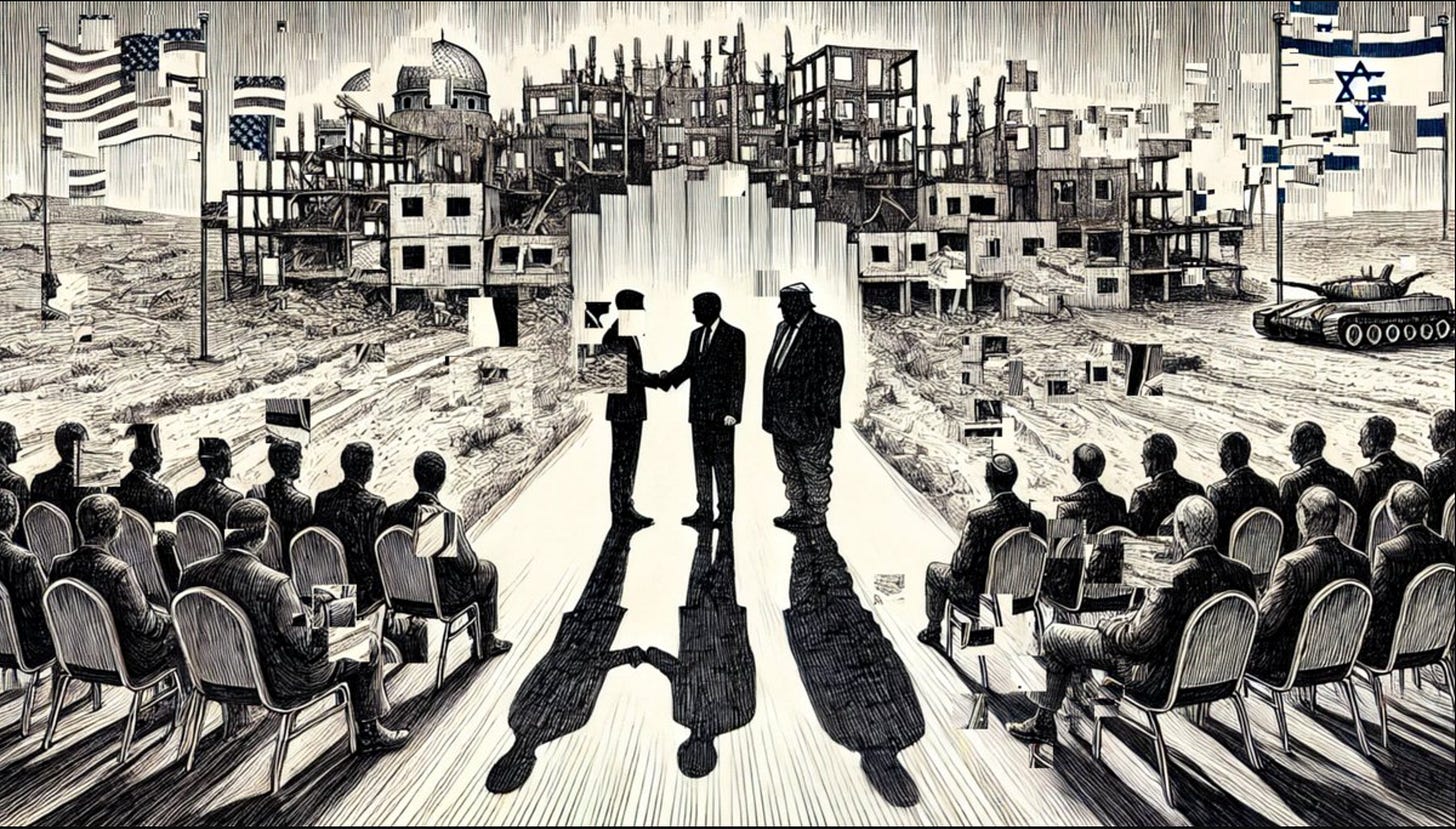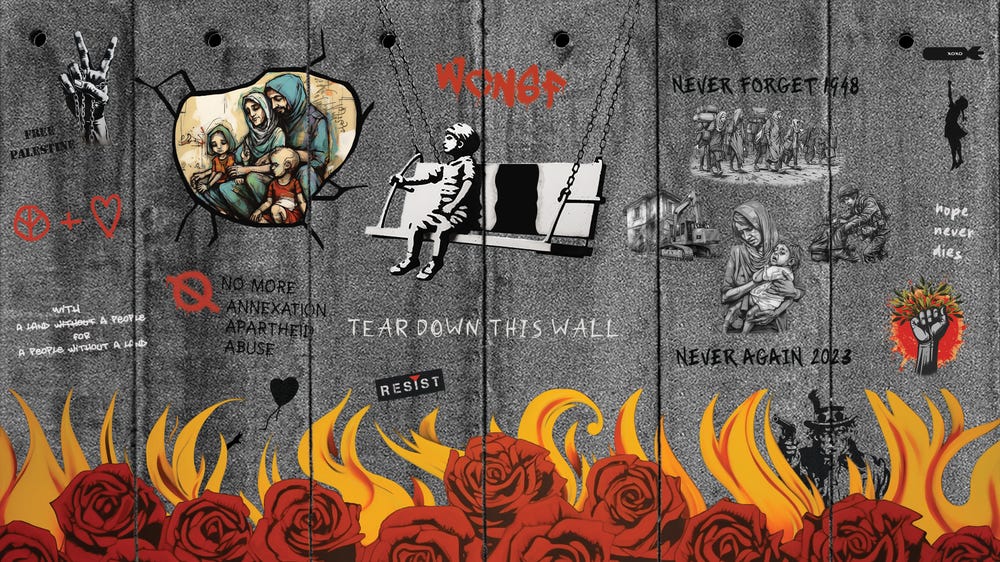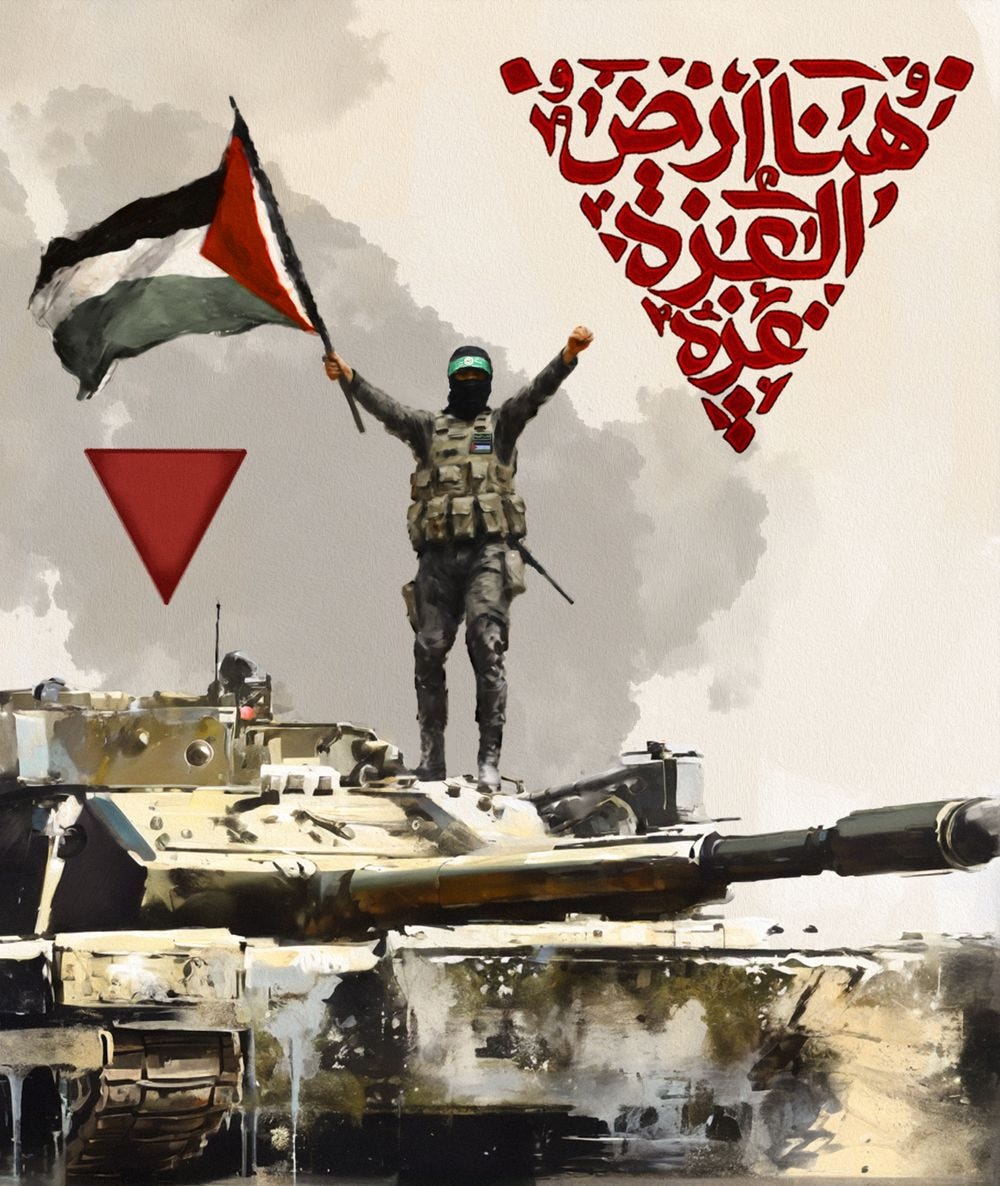Hamas Can Relinquish Governance but Not Arms
Disarmament is not de-escalation. It's elimination.
The question of whether Hamas should disarm is often posed as a precondition for peace. But this framing misrepresents both the nature of Palestinian resistance and the history of colonial repression. What's being demanded is not coexistence—it's capitulation. And history has already shown what surrender leads to.
In a recent statement, Hamas reiterated that it is willing to relinquish governance in Gaza to a national consensus government, but will not disarm. This distinction reflects the essence of the current phase of the Palestinian struggle.
To give up arms in Gaza under current conditions would not lead to peace. It would open the door to population transfer. The destruction, the displacement, the starvation—these are all designed to create the conditions for pushing people out. Without weapons, there would be no deterrent. There would be no line. Gaza would be emptied, and the world would call it humanitarian.
The so-called "Trump Plan" is a publicly announced ethnic cleansing proposal—one that calls for the transfer of Palestinians to other countries. Though it bears Trump's name, this plan predates his birth by decades. In fact, it is as old as Zionist thinking itself.
As early as 1895, Theodor Herzl was writing about spiriting Palestinians across borders while denying them employment in the emerging Jewish economy—economic pressure designed to force departure—with transfer executed "discreetly and circumspectly." By the time of The Great Palestinian Revolt (1936–1939) and British inquiries into the future of Palestine, the idea of population transfer was an openly debated and politically organized strategy. The British Peel Commission proposed the partition of Palestine in 1937 and explicitly recommended the voluntary—and if necessary, forced—transfer of Palestinian Arabs from the proposed Jewish state.
Just as Zionist leaders enthusiastically back the "Trump Plan" today, David Ben-Gurion zealously endorsed the Peel Commission proposal in 1937. He declared: "We must assist in this transfer. We must insist on this point… we must be ready to carry out the transfer." The objective has always been the same: to engineer a Jewish majority and reshape the demographic reality of Palestine. The Nakba of 1948 was the planned execution of these earlier transfer strategies—and it continues to this day.
As settler colonialism scholar Patrick Wolfe wrote, "Settler colonialism is a structure, not an event"—transfer is not a one-time policy but a continuing strategy.
The question then becomes: how is this displacement achieved? History reveals the mechanism—and it invariably begins with calls for disarmament.
In 1936, during the Great Palestinian Revolt—a moment when Palestinians were on the verge of fundamentally challenging the British-Zionist alliance—they were pressured by Arab monarchs and British officials to halt their general strike and lay down their arms and trust in Britain's promises of justice. Once disarmament was complete, the next chapter was catastrophe: the 1948 Nakba. A national uprising was broken, and within a decade, nearly 800,000 Palestinians were expelled from their land.
During the Israeli invasion of Lebanon in 1982, the Palestinians placed their trust in American mediator Philip Habib and U.S. guarantees. The PLO withdrew from Beirut under a U.S.-brokered agreement that included explicit assurances of protection for the civilians left behind in the camps. The result: Sabra and Shatila—the massacre of up to 3,500 Palestinian refugees in camps supposedly under international protection.
After the Oslo Accords in 1993, the disarmament of Palestinian resistance paved the way for a dramatic increase in settler violence, land theft, and expansion throughout the West Bank. The settler population exploded from 110,000 to nearly a million—a ten-fold increase that transformed the geography of occupation. Wasn't this concession done in the name of "peace"?
The pattern is clear: arms surrender leads to massacre, displacement, and erasure.
It's not peace they're after—just silence.
Given this historical pattern, Hamas' armed resistance must be understood not through the occupier's lens of “terrorism” but as rational strategy under impossible conditions.
This is an Occupation that cannot function without oppression, repression, and expulsions. And the resistance it necessitates is then conveniently labeled as terrorism. Accepting this framing, whether through condemnation or otherwise, legitimizes the idea that those living under oppression must wait for their oppressor to grant them freedom—which, of course, is the point.
In this context, October 7 becomes comprehensible not as senseless violence, but as strategy. It was not a spontaneous outburst, but a response to the slow, deliberate suffocation of the Palestinian people and their cause. The Al-Aqsa Flood operation was an attempt to prevent the final liquidation of Palestine.
This suffocation was concrete and accelerating. Gaza, after 16 years of siege, was exhausted but still functional. A sense of hopelessness was growing—as if the world had accepted the blockade and its slow death, just as it had accepted what was already unfolding in the West Bank: ethnic cleansing by settlers, the Judaization of Jerusalem, and the tightening grip of apartheid.
In recent years, the Occupation had been forcibly imposing its will through its most extremist government yet. It had passed openly racist laws like the "Nation-State Law," targeted UNRWA, and accelerated settlement expansion in Jerusalem and the West Bank—reaching unprecedented levels in 2022, even confirmed by the European Union's 2022 report. This came hand-in-hand with waves of normalization and a shameful retreat in official Arab positions, leaving the Palestinian cause politically exposed and diplomatically abandoned.
Hamas's operation on October 7 was a historical moment—born of suffocation, frustration, and existential threat. To isolate it from this context absolves the colonial system of responsibility while criminalizing the colonized response.
Beyond its historical inevitability, October 7 achieved something strategically significant. Al-Aqsa Flood resembles the Tet Offensive during the Vietnam War—not in outcome, but in impact. The Tet Offensive was a tactical failure for the Viet Cong and North Vietnamese forces, who suffered heavy losses and failed to hold territory, yet it psychologically shook American confidence in the war. Al-Aqsa Flood, by contrast, was a swift and tactically successful operation, completed within hours. But like Tet, it fractured the occupying society's belief in its own permanence—and that fracture carries real consequences.
Colonial projects like Israel's don't rest on organic connection to the land, but on attracting settlers through calculations of cost, security, and sustainability. That's what makes them vulnerable. Even if Al Aqsa Flood wasn't a knockout blow, it initiated the exhaustion of a colonial project that can be defeated—if maintaining it becomes too costly.
Even Western public opinion—long shaped by Zionist narratives—is beginning to shift. Al Aqsa Flood accelerated this process by forcing a global audience to witness Israel's response in real time. More people now understand that what's happening is not a "conflict" but a decades-long campaign of ethnic cleansing. It is now clear to them that the Zionist project demands support for genocide.
This shift extends far beyond Western publics. The Global South, long skeptical of Western narratives, has largely rejected Israel's justifications. Institutional pressure is mounting: the ICJ is hearing South Africa's genocide case against Israel and has imposed provisional measures. Meanwhile, the ICC has issued arrest warrants for Netanyahu and Gallant on charges of war crimes and crimes against humanity.
Universities across Europe are cutting ties with Israeli institutions, BDS campaigns are gaining global momentum, and even traditional allies are beginning to question unconditional support. The international isolation that once helped dismantle apartheid South Africa is now forming around Israel.
Meanwhile, internal cracks are forming within Israeli society: widespread refusal to report for reserve duty, concealed casualty figures, and growing structural and political tensions.
This exhaustion is why the timeline matters less than the commitment. The point isn't whether liberation comes this year or next, but maintaining resistance for as long as it takes—even four or five generations. This cause is not bound by time—it is a historical obligation.
This long-term resistance transcends any single organization. Hamas, like all Palestinian factions, exists to express the people's will. When movements fail, the people replace them—as happened with Fatah after abandoning the national project in Oslo, and with the Palestinian left, including groups like the PFLP, who despite opposing Oslo and normalization, could not adapt to new realities after Soviet collapse, struggling with aging leadership in exile and failing to build mass support or viable resistance infrastructure on the ground. But the Palestinian people remain loyal to the cause, not to organizations.
This is why Hamas can give up governance. It can say: let another Palestinian body administer civilian life in Gaza. But it will not give up weapons—because that would be an invitation to ethnic cleansing.
Palestinians today are not being offered political alternatives, only the choice between extermination and survival. From this position, resistance becomes not just a means—it is the goal itself. Resisting the settler-colonial presence is a form of existence, meaning, and dignity. It is a colonizer's dream for Palestinians to believe that resistance is futile, or just one "option" among many.
Reject the idea that resistance can be abandoned. Our purpose is resistance—and that resistance aims to dismantle a colonial system entirely. Just as South Africa's liberation came through dismantling apartheid, Palestine's liberation depends on dismantling Zionism.
Zionism is not a reformable political system—it is an expansionist, exterminatory ideology. As long as it remains intact, all political "understandings" are illusions. Israel got a favorable ceasefire agreement in Lebanon, yet chooses to bomb at any moment without regard for the agreement. There is no reasoning with a settler-colonial project that demands total submission by the entire region. The order matters: first you dismantle the project, then you discuss political futures.
The voices calling for resistance to lay down weapons are not asking for peace—they are asking Palestinians to surrender their future. They demand capitulation under the guise of pragmatism, knowing full well that surrender leads not to coexistence, but to erasure. The cost of surrender is always greater than the cost of resistance.







Clear, and unambiguous. 🙌Powerful writing 🫡🖤
Amazing article